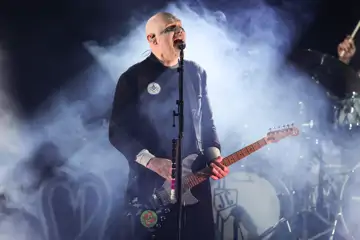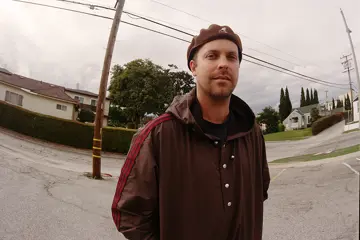THE HOUSE THAT JACK BUILT
★★1/2
Wait, this is it? This is the work that incited walkouts, 1-star reviews, and moral panic upon its premiere at Cannes last year? This is the pic passed over by all Australia’s major film festivals, deemed too difficult or disreputable or radioactive to bother with? This is the movie that viewers were warned against, lectured on, and needed to be shielded from?
The House That Jack Built isn’t, it turns out, a scourge on the Earth that needs to be eradicated. Instead, it’s a (kinda) serious, ambitious piece of cinema at once challenging, difficult, and, ultimately, kind of dull.
The fourteenth feature film for infamous Danish director Lars von Trier, is, really, in keeping with the previous thirteen. It’s full of illustrative imagery, religious allegory, ironic meta-movie devices, blatant provocations, and a weird mixture of self-aggrandisement and self-critique. It is, admittedly, one of his least inspired movies, but that hardly means it should be kept from screens.
And, just as its maker has made plentiful films that played like pairs before — Breaking The Waves and Dancer In The Dark; Dogville and Manderlay; Antichrist and Melancholia — this isn’t a film that exists in depraved isolation. Instead, The House That Jack Built is a veritable companion movie to his last, 2013’s Nymphomaniac, echoing that film’s narrative structure and years-spanning tale.
Don't miss a beat with our FREE daily newsletter
In Nymphomaniac, von Trier chronicled the sexual history of its lead character, recounted via a framing-narrative conversation — and in chaptered instalments — with an iconic old man of European cinema (Stellan Skarsgård). The House That Jack Built echoes that form: von Trier chronicling the murderous history of this flick’s lead character; a glowering, sourfaced architect played by Matt Dillon. Our protagonist is certainly no charismatic anti-hero, clocking in somewhere between smug dipshit and tedious woe-is-me male.
Films with repellent main characters often find audience blowback; viewers seemingly wanting all leads, even serial-killers, to be models of charm and wit. But, given The House That Jack Built is a study of toxic masculinity, misogyny, and psychopathy, it makes sense that the lead character is loathsome, entitled, a nightmare.
Dillon plays a killer whose run of victims, recounted via its own ongoing conversation, are largely women. Given the outrage that met The House That Jack Built upon its arrival in the world, you’d expect that there’d be scenes, herein, where the main character — and perhaps, in turn, the director — is revelling in the suffering of victims. But there’s none, really. Compared to your run-of-the-mill torture-porn movie — whose fetishism for female suffering is veritably contained in the genre’s name — The House That Jack Built has very little blood on its screen.
Instead, most of the violence is inferred, or happens out of frame; scenes never diving in anything approaching body-horror or gruesome corporealism. What von Trier does, via implication, is make the horrors of a viewer’s mind, not a character’s body. Thus, he’s throwing familiar cinematic suffering back at audiences, putting them in the uncomfortable position of wondering why they — why we — can happily accept violence on screen in certain forms, but not in others.
Of course, von Trier lacks the formalist rigour of, say, Michael Haneke, who expertly undertook this conceptual concept, twice over, with both his Austrian and American Funny Games. Lars, as ever, seems smirking and smug in his provocations, and knowingly so; this is a director, after all, who made a documentary, The Five Obstructions, that was basically about how much of a dick he is.
Again, in The House That Jack Built, von Trier isn’t above interrogating himself. The framing-narrative finds Dillon in conversation with the late Bruno Ganz; the Hitler of memedom cast in a film by a director who, at Cannes in 2011, infamously self-identified with the Führer. At first, the two men talk in disembodied voice-overs; before, eventually, it’s revealed that they are discussing Dillon’s murderous life from in perdition itself. Along the way, throughout the pic, Ganz effectively serves as a running critique on the action, and on the filmmaker’s motives: calling into question tired tropes, storytelling clichés, and the gender politics that underpin them.
In many ways, this feels like another von Trier film in which women are victimised by the horrors of patriarchal society; a narrative device, etched in Christian martyrdom, that ran through Breaking The Waves, Dancer In The Dark, and Dogville. Where those films were tragedies — or tragicomedies — submitting their lead characters to various humiliations and horrors, by flipping the narrative set-up, here, von Trier is doing something far more confronting: making us side, storytelling-wise, with the man perpetrating those horrors, and giving us no pleasure in doing so.
When the film’s final act moves into a literal depiction of hell, The House That Jack Built culminates with something wildly-stylised and brightly cinematic. And, in its own, religious way, an ultimate depiction of moral reckoning, and eventual punishment for unconscionable sins.
It’s an inspired ending to a film that, for all its provocations and posed questions, fails on a far more fundamental level. At 155 minutes, The House That Jack Built is long, slow, and a total slog. Those inspired to walk out or denounce the film could’ve been operating out of moral outrage, but just as likely they were motivated by boredom. Boredom from the film’s laggard pace, sure, but also from its male-violence-on-screen familiarity.
GRETA
★★★1/2
Greta is a run-of-the-mill thriller pushed to realms comic, ridiculous, and even artistic by some timely screenwritten reveals, neat sleight-of-hand filmmaking tricks, straight-up references to Takashi Miike’s classic Audition, the expert employment of a St. Vincent jam, and the presence of one of the greatest actors in the world, Isabelle Huppert. She plays the titular character, a lonely, 60-something woman befriended by Chloë Grace Moretz, who plays the naïve, fresh-faced foil freshly arrived in the big, bad New York City. From the moment we see Huppert scrolling through Moretz’s Facebook pictures, we suspect this little old lady isn’t to be trusted; and, with each screechingly-dramatic squall of discordant strings that announce her visual arrival, we’re essentially forewarned of the bad things in store.
All this is, somewhat surprisingly, directed by Neil Jordan. Jordan isn’t a stranger to genre pictures — with Interview With The Vampire and Byzantium, he’s made two vampire movies — but it’s curious to see him making something that’s essentially experiential, a cute carnival-ride that’s a whole lot of fun but nothing more.
Watching Greta, you can almost see the worse version of this film playing out, in your mind. Which is all to say, really, that it’s better than it should be. So much of that falls back on Huppert, who has the ability to elevate any material. Here, a silly teen-thriller is made to feel like some kind of cousin to The Piano Teacher, Huppert tapping deep into dark psychological places, and making a happy home, there. She takes what could’ve been a forgettable antagonist into a thrilling villain, one who’s the savage centre of a whirring, giddy cinematic contraption.
EVERYBODY KNOWS
★★★
Even the greatest filmmaker of this century is allowed a stumble. Asghar Farhadi’s work from Fireworks Wednesday through About Elly, A Separation, and The Past can be weighed up against any four-film run from any filmmaker, ever. But Everybody Knows, the first Spanish-language feature for Farhadi, will be a disappointment for anyone expecting another masterwork from the great Iranian auteur. Instead, it’s a kidnapping thriller that lets its melodrama run a little too wild, its tone feel a little too soap-operatic.
Farhadi recruits a top-line cast — Penélope Cruz, Javier Bardem, Ricardo Darín, Inma Cuesta, Bárbara Lennie, Eduard Fernández — in a film that gathers an extended family, many returning to their small-town hometown from far-flung shores for a grand, celebratory wedding.
At first, the number of characters, and their relationships, seems dizzying; but Farhadi soon establishes a host of histories. But, where the director’s best films feature definitive events occurring out-of-frame, and leave inciting events firmly unknowable, Everybody Knows is a sucker for grand revelations, the pursuit of buried secrets and ultimate truths. Whilst there’s a Farhadian parable lurking herein — about village gossip, the paranoia of being gossiped about, and the exploiting of family secrets for personal gain — it’s, ultimately, overshadowed by the frothy, grandstanding, moralist machinations of the thriller.
NON-FICTION
★★★1/2
Olivier Assayas has made a lot of films, of many different stripes, but his latest, Non-Fiction, feels like it fits snugly between Late August, Early September and Summer Hours. It’s a conversation-piece about the changing landscape of 21st-century publishing, in which a host of characters openly discuss the way things are, and where they may be going. Books, literature, bloggers, Twitter, electronic publishing, audiobooks, autofiction, celebrity gossip, fake news, political discourse, ideals, idealism, personal branding, algorithms, virality, SEO, influencers, the role of the critic, the pursuit of truth: all these things are thrown into the dialogue, making for a film that plays as perilously of-the-moment.
These conversations are staged by Guillaume Canet and Pascal Greggory (as a publisher and his proprietor), Juliette Binoche (an actor), Vincent Macaigne (a writer), Nora Hamzawi (a political advisor), Christa Théret (a digital strategist); the actors revelling in a film filled with not just plentiful monologues, but words and situations that feel alive. In many ways, Non-Fiction feels light. Its few moments of familiar screen drama come with adulterous affairs; which are, in that French fashion, never the source of moral handwringing or melodrama.
But the movie is, ultimately, a study of the constancy of change. Its many conversations essentially alight on a simple position: rather than clinging to the past or trying to predict the future, the best bet is to roll with the changes as they come. In that way, it’s another exemplar of Assayas being influenced by his former partner, Mia Hansen-Løve, whose filmography is full of narratives riding the waves of change with sanguine grace.
THE PRICE OF EVERYTHING
★★★
Who needs satire when you’ve got reality? Dan Gilroy recently mocked the art-world in the middle of his comic horror-movie Velvet Buzzsaw, but, watching Nathaniel Kahn’s documentary The Price Of Everything, you can see a whole lot of real-life humans that are effectively high-art stereotypes manifest. It’s a portrait of high-art’s high-society wheelers and dealers, agents and the brokers, clients and socialites, and, sometimes, even, the artists in the middle of this high-finance feeding frenzy. It’s less a study of the relationship between art and commerce, more an unblinking look at a bright financial bubble, at once radiant, ridiculous, and fragile.
In chronicling the crazy auction prices of contemporary art and the ultra-wealthy who trade in them, The Price Of Everything is, of course, a grand symbol of late-capitalism at its most decadent and grotesque. Kahn calmly watches on at this world of auctioneering and speculation, where the free market drives prices into the tens of millions, and drives this realm further from anything resembling recognisable reality. Viewers are, essentially, taken on a tour of a foreign world; one that already scans as surreal, and will, once the bubble has burst, look like an unimaginable horrorshow in hindsight.
SOMETIMES ALWAYS NEVER
★★★
Sometimes Always Never is a film based on a short story, by screenwriter Frank Cottrell Boyce, called ‘Triple Word Score’. This flags the fact that it’s a drama veritably told through Scrabble; through words, definitions, and logophiles. It’s about a family of Scrabble obsessives — Billy Nighy, Sam Riley, Alice Lowe, Louis Healy — who communicate via words and word-scores, often struggling to talk about the tragedy, the disappearance of a wayward, prodigal son/brother/uncle, that really unites them. Of course, just in case the metaphor didn’t go far enough: this absent figure, a ghost haunting in their lives, disappeared during an argument over, of course, a game of Scrabble.
Bringing it to screen, debutante director Carl Hunter makes the movie meta-theatrical: with ersatz-feeling sets, deliberately stagey lighting, luridly-coloured backdrops, and even openly-unconvincing rear-screen projection. The result makes the film play as visually unreal, but also openly evokes the theatre. The direction is, in its own way, as cutesy as the script; this a film about old family wounds that plays as so light and charming as to almost feel trivial.















